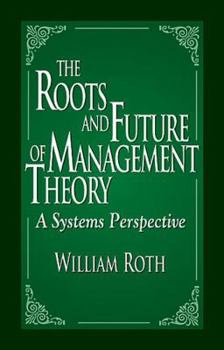The Roots and Future of Management Theory: A Systems Perspective
Select Format
Select Condition 
Book Overview
Interesting and easy-to-read, The Roots and Future of Management Theory: A Systems Approach provides a comprehensive overview of today's workplace -past, present, and future. The author brings the key characters in the evolution of management theory to life. Not only will your students understand the roots of our current situation, how workplace change happens, and what forces are involved - they will see how it fits into changes in society as a whole. There have obviously been many changes in the workplace from the Medieval Period to the present, and there will certainly be even more changes in the future. This book explores these changes and connects them to changes in: general philosophy (rationalism, empiricism, pragmatism); religious philosophy (Catholicism, Protestantism); social philosophy (Machiavellian Humanism, Christian Humanism); economic philosophy (laissez faire, Communism); and workplace philosophy (technology as a friend, technology as an enemy). Battles have raged through the ages between these opposing forces, affecting management systems, the quality of working life, and life in general. The author discusses how this has lead to today's quest for a synthesis of the strengths of these forces, and suggests that it has been found in the systems approach. He describes what this synthesis - combined with the powers of the computer - could and should lead to in the future. Written at a level that both graduate and undergraduate student will understand, The Roots and Future of Management Theory provides an overview of management theory. Comprehensive but not overwhelming, this textbook will give your students an understanding the changes in the workplace since the beginning of the industrial age, and offer them some insights into the changes most likely to occur in the 21st century.
Format:Hardcover
Language:English
ISBN:1574442430
ISBN13:9781574442434
Release Date:August 1999
Publisher:CRC Press
Length:232 Pages
Weight:0.05 lbs.
Dimensions:0.7" x 6.3" x 9.3"
Customer Reviews
1 rating
The New Growth-Development Ethic
Published by Thriftbooks.com User , 21 years ago
This is another wonderful book from the prolific writer, William Roth! The author takes us into a beautiful journey of the evolution of management theories beginning with the economic and social timeframes from the Pre-Industrial Revolution through the Post-Industrial Revolution. The theories discussed deal with the religious and philosophical factors that have influenced society and the economy, and how the internal and external forces have contributed to our socioeconomic policies. The author begins by taking us back to the Medieval Period where one's work was a skill or an art passed on from father to son. Work was a source of pride, and allegiance to one's work coincided with allegiance to one's superior, usually the lord of an estate. Religion played a critical role during this period because the Church was highly involved in dictating the business of work to skilled artisans and craftsmen. Trade was conducted in Medieval society with the Church having a major part in the affairs of workers. The Reformation Period which followed brought us into the minds of various philosophers who questioned man's position in the world and the rational quest for religious insight. Calvin's notion of "predetermination" engulfed society in a quest for working diligently on earth. Eventually this collective mindset overshadowed the strength which the Church once exhibited in people's lives. Ultimate truths were questioned during this period in the philosophies of skepticism and rationalism. The scientific method introduced us to theories from Copernicus and Galileo relating to the earth and its position in the universe. The Church is losing its hold as an influential factor in the lives of individuals during this fascinating period. The Enlightenment period follows where Adam Smith and his treatise "The Wealth of Nations" takes a firm hold of society. Importantly, Smith espoused the "laissez faire economics" which catapulted the division of labor and brought forth the Industrial Revolution which changed everything in everyone's lives. This period gave rise to England's "manufactories" and the consequential injustices toward unskilled workers and child laborers. Working conditions were poor and laissez faire economics was not the solution to the injustices brought about by the mechanistic organizations of this critical historic Period.The author discusses the Industrial Revolution and its socioeconomic ramifications. Industrialization brought about the need for better management and organization of the work force. Trade unions grew as a result of injustices in the workplace that were not corrected by companies. Individuals performed mindless, mechanical work during this period where labor was exploited ruthlessly by individuals who saw not the needs of the workers, but the numbers that generated income and profits. As a consequence of the social inequity, workers began to unite and play a proactive role in their destinies as human beings in the work forc





